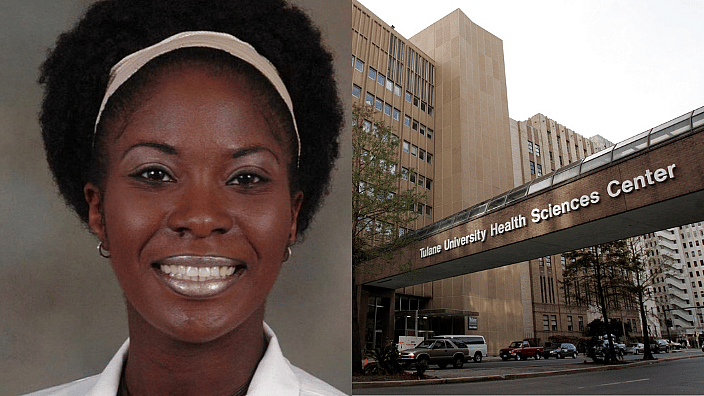A running joke in the NFL is that Black assistant coaches only get a head coaching opportunity after the implosion of a white-run regimen. The perception is that Black head coaches are not adequate leaders and their presence may deter fans. Apparently, this idea persists in some medical circles as well.
Last week, Tulane University School of Medicine (TUSM) suspended Dr. Princess Dennar, a Black physician, from her position as residency program director for the school’s medicine and pediatrics programs. The New Orleans-based school offered no reason why, but the timing of Dennar’s suspension was peculiar given that she had filed a lawsuit alleging racist and sexist treatment by school leaders five months earlier.
Read More: Black doctor leaves Seattle hospital citing racism toward staff, patients
Dennar, a graduate of Drexel University School of Medicine and the first Black woman to be named a residency program director at TUSM, was originally denied her current role. Upon reconsideration, she was given the position, but only if she was willing to share the position with a white male colleague after a dean at the medical school admitted that the administration feared that her hiring would deter white applicants — an allegation that Tulane’s administration vehemently denies.

If Tulane made this assertion it would be baffling to say the least, as I have never heard an eager medical student cite or insinuate the race of a program director as a reason why they would not rank a program. Instead, the population that the hospital serves, location, research rankings and the chances of a significant matching at the program are the factors weighed most heavily when formulating a rank list.
The only rational explanation of their assertion seems to be that the administration projected their bias onto potential applicants — an egregious and irresponsible act worthy of a self-imposed suspension, if true. But I digress.
Dennar, who claims that she fulfilled 100% of the position’s responsibilities despite being given 50% of the title in her lawsuit, did what any empowered employee would do — she reported the incident. Not surprisingly, Dennar was suspended. This story is neither uncommon nor shocking to Black and Brown folks. The recruitment and retention rates of Black and Brown doctors are at an all-time low and the Black doctors who persevere are forced to deal with racism and discrimination.
Read More: Black infant mortality rate much lower when delivered by Black doctors, researchers find
In response to protests against police violence and persistent societal racism, many medical organizations have pledged to promote an anti-racist culture by increasing implicit bias training among staff and ramping up the recruitment of Black and Brown doctors.

Unfortunately, this renewed commitment falls short at institutions like Tulane because they fail to realize that racism in the workplace is not just an individual problem requiring an individual intervention, but a structural and organizational problem that requires a massive cultural overhaul to change. Racism in the workplace is an impediment to achieving optimal performance for Black doctors and reflective of the race-based discrimination that continues to plague society.
We are in dire need of a cultural shift in medicine so that experiences like Dennar’s inch closer toward the exception than the norm, because we cannot afford to lose Black doctors, especially those in decision-making positions. African Americans comprise 13% of the American population but represent only 5 percent of U.S. physicians. Not only do potential Black doctors match into residency programs at lower rates, but they are more likely to remain “chronically unmatched” while accruing massive amounts of debt.
These would-be doctors are most likely to return to Black communities, but they are often prevented from doing so, worsening health disparities. Dennar’s position as gatekeeper to valued residency spots is integral to mitigating health disparities because her presence alone may influence students to continue their training in Louisiana, a state that is known for some of the nation’s worst health outcomes for Black populations.
The health outcomes for Black Americans are staggering. Black men have the shortest life expectancies. Black women have the highest maternal mortality rates. Black babies have the highest infant mortality rates. The need for more Black doctors is more evident now than ever to reduce racial gaps in medical outcomes.
Read More: Indiana hospital reacts to Black doctor dying of virus after claims of racism

Unfortunately, this is compromised when potential applicants are dissuaded from entering the field, following events such as this. The conversation for medical students should center on the quality of training they will receive; instead many are left questioning whether going into medicine is worth the mental, emotional, and financial sacrifice.
While Dennar’s case remains in litigation, her story is a reminder that the fight for equality continues. And the message is loud and clear: racism will not be tolerated. We should not take her claims lightly. Fair treatment in the workplace includes dignity at work, merit-based promotion, equal access to opportunities and comparable working conditions and pay.
If nothing else, Tulane University School of Medicine may want to revisit their recruitment and retention policies to root out systemic racism and avoid the dubious distinction of being a “good ol’ boys club” like the NFL.

Dr. Shamard Charles is an assistant professor of public health and health promotion at St. Francis College and sits on the anti-bias review board of Dot Dash/VeryWell Health. He is also host of the health podcast, Heart Over Hype. He received his medical degree from the Warren Alpert Medical School of Brown University and his Masters of Public Health from Harvard’s T.H. Chan School of Public Health. Previously, he spent three years as senior health journalist for NBC News and served as a Global Press Fellow for the United Nations Foundation. You can follow him on Instagram @askdrcharles or Twitter @DrCharles_NBC.
Have you subscribed to theGrio’s podcast “Dear Culture”? Download our newest episodes now!
TheGrio is now on Apple TV, Amazon Fire, and Roku. Download theGrio today!


